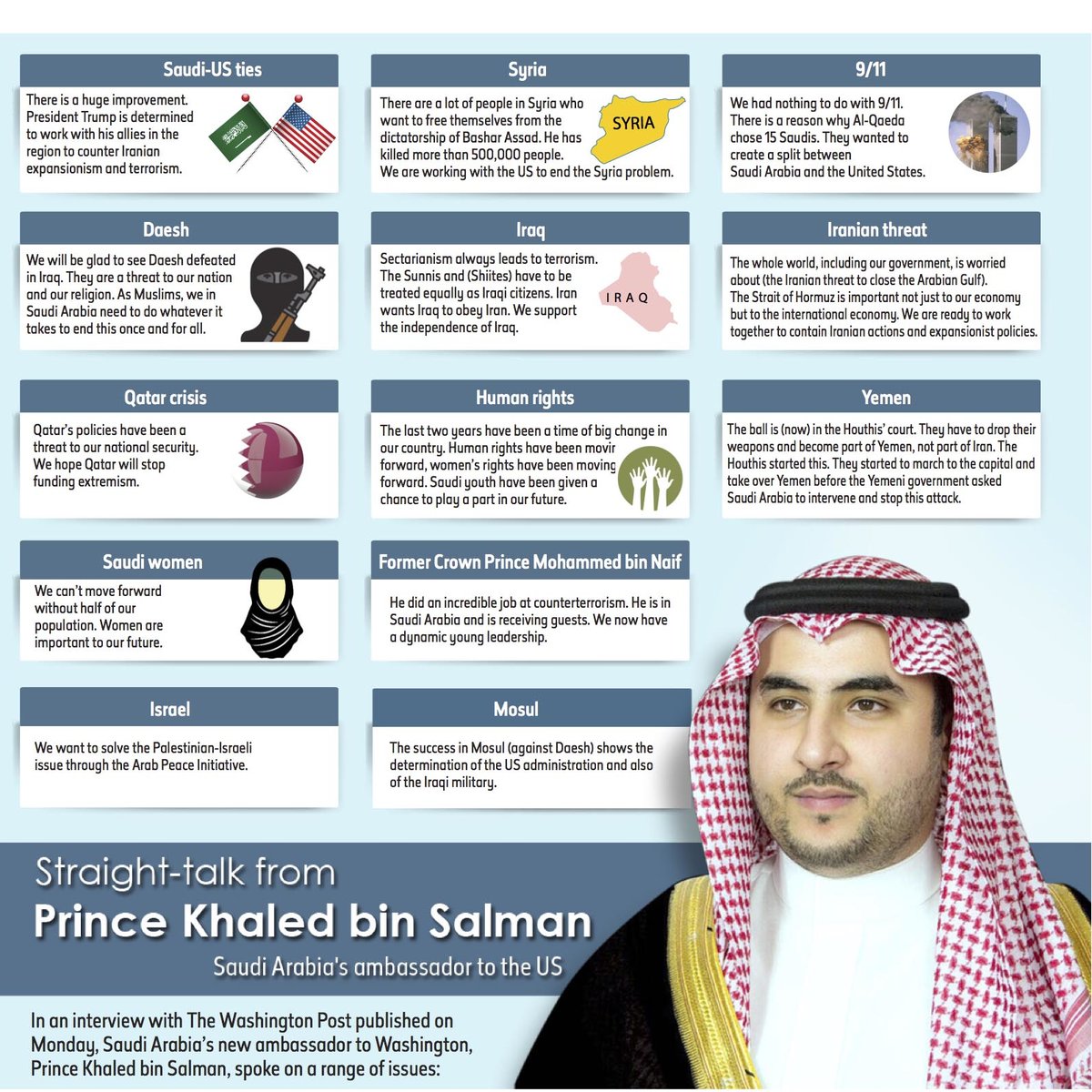JEDDAH: A huge improvement is witnessed in the Saudi-US relationship under the Trump administration, said the new Saudi ambassador to the US Prince Khaled bin Salman who recently presented his credentials to President Trump.
“I think that President Trump is determined to work with his allies in the region to counter Iranian expansionism and terrorism,” the envoy said in an interview with the Washington Post.
Addressing the Qatari crisis which has erupted in the region during the last two months, the Saudi prince said that Qatar’s policies are endangering the region’s national security. “I think Qatar’s policies have been a threat to our national security, especially when they interfere in our domestic politics and support extremists. In Syria, they have supported Al-Qaeda affiliates and some terrorist [Shiite] militias in Iraq,” he added hoping Qatar will stop funding extremism.
Prince Khaled rejected all claims made against his country regarding its support for extreme groups in Syria and said Saudi Arabia is “on the frontline of fighting terrorism,” whereas terror in Qatar is “government-funded.”
The interview also included Syria and its factions, where the prince confirmed that there are some moderate opposition groups such as the Free Syrian Army. “There are a lot of people in Syria who want to free themselves from the dictatorship of Bashar Assad. We are working with our allies to help stabilize Syria,” he said.
According to the Saudi envoy, more than 500,000 Syrians have been killed in the war. He affirmed that Riyadh and Washington are working together to put an end to the Syrian conflict, expressing his support of rid Syria of Assad altogether.
Prince Khaled, who is son of the current Saudi king and the brother of the new crown prince, denied the rumors surrounding his brother’s promotion. “I think His Highness (Mohammed) bin Nayef did an incredible job at counterterrorism. The king made the decision, supported by the Allegiance Council. Prince bin Nayef is in Saudi Arabia and is receiving guests,” he said slamming all allegations made against his brother about eyeing his cousin’s position forcing him out of his way to the throne. “We now have a dynamic young leadership, determined to push the country forward and to diversify our economy.”
Saudi Arabia is moving in the right direction in terms of human rights, said the envoy. “The last two years have been a time of big change in our country. Human rights have been moving forward, women’s rights have been moving forward. Saudi youth have been given a chance to play a part in our future,” he added.
The wise Saudi leadership recognizes the vital and essential role women are playing in the country’s future as it “can’t move forward without half of our population.”
Once agains, Saudi Arabia stood its ground regarding the Palestinian-Israeli conflict affirming that his country wants “to solve it (the issue) through the Arab peace initiative, and if Israel recognizes Palestine based on the 1967 borders, the Arab world has agreed to do so.”
As for the Sunni-Shiite conflict in Iraq, the prince insisted Iraqis to be treated equally in order not to lead to the creation of another bloody spring. “Sectarianism always leads to terrorism. The Sunnis and [Shiites] have to be treated equally as Iraqi citizens,” he added. “Iran wants Iraq to obey Iran. We support the independence of Iraq.”
The prince agreed that Daesh is a threat to Saudis and Muslims in general and need to be defeated in any way possible. “As Muslims, we in Saudi Arabia need to do whatever it takes to end this once and for all.”
As complicated as many people in the west think, Saudi Arabia did not start the war against Houthis in Yemen, denied the prince. “They started to march to the capital and take over Yemen before the Yemeni government asked Saudi Arabia to intervene and stop this attack,” he explained. The ball is [now] in the Houthis’ court. They have to drop their weapons and become part of Yemen, not part of Iran.”
Iran’s closure of the Strait of Hormuz is part of its dangerous scheme in the region. Prince Khaled said the Iranian threat is concerning the entire world, not only Saudi Arabia. ”The Strait of Hormuz is important not just to our economy but to the international economy,” he said.
He added that US and its allies do realize the size of the Iranian threat to international security. “We are ready to work together to contain Iranian actions and expansionist policies,” he said.
September 11 attacks also took part of the interview, where the Saudi envoy renewed his country’s rejection of all false claims associating it with the attack. “We had nothing to do with 9/11. In 1996, Osama Bin Laden issued a declaration of war against the United States and Saudi Arabia. In 1994, we took away Bin Laden’s Saudi citizenship when he was in Sudan,” Prince Khaled told the Washington Post. “We think the same people who attacked the United States on 9/11 attacked us in Saudi Arabia multiple times.”
He said that Al-Qaeda had a plan in placing 15 Saudis among the attackers as they wanted to “create a split between Saudi Arabia and the United States.”




























